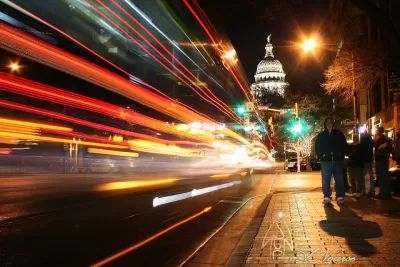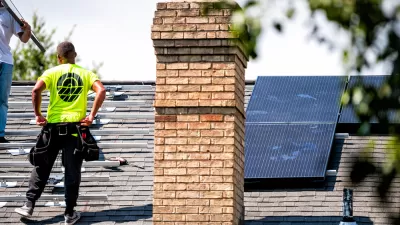Creating a new version of the "haves" and the "have nots," Richard Florida distinguishes cities struggling against state-level anti-urban policies from cities that get more support from the state.

Richard Florida opens his latest article for CityLab by sharing a familiar refrain heard in blue cities located in red states: "The folks in our state government and state legislature are against us." According to Florida's take, the problem is worsening in the Trump era of U.S. politics, and "a growing number of cities and metro areas are also located in states which are actively undermining their interests."
To quantify the damage that anti-urban state policies can have on urban localities, Florida worked with his Martin Prosperity Institute (MPI) colleague, Patrick Adler, to build an infographic to separate the state-supported local urban areas, from the state-obstructed local urban areas. Following the chart, Florida lists some of the anti-urban policies that have earned states like Texas, Georgia, North Carolina, and Arizona their reputation.
"This split between states is becoming yet another factor in America’s deepening spatial inequality," writes Florida. "Over time, the relatively small group of cities and metros in pro-urban states are likely to develop even deeper advantages in attracting talent and building the knowledge economy."
FULL STORY: Anti-Urban States Aren't Just Hurting Their Cities

Alabama: Trump Terminates Settlements for Black Communities Harmed By Raw Sewage
Trump deemed the landmark civil rights agreement “illegal DEI and environmental justice policy.”

Study: Maui’s Plan to Convert Vacation Rentals to Long-Term Housing Could Cause Nearly $1 Billion Economic Loss
The plan would reduce visitor accommodation by 25% resulting in 1,900 jobs lost.

Planetizen Federal Action Tracker
A weekly monitor of how Trump’s orders and actions are impacting planners and planning in America.

Wind Energy on the Rise Despite Federal Policy Reversal
The Trump administration is revoking federal support for renewable energy, but demand for new projects continues unabated.

Passengers Flock to Caltrain After Electrification
The new electric trains are running faster and more reliably, leading to strong ridership growth on the Bay Area rail system.

Texas Churches Rally Behind ‘Yes in God’s Back Yard’ Legislation
Religious leaders want the state to reduce zoning regulations to streamline leasing church-owned land to housing developers.
Urban Design for Planners 1: Software Tools
This six-course series explores essential urban design concepts using open source software and equips planners with the tools they need to participate fully in the urban design process.
Planning for Universal Design
Learn the tools for implementing Universal Design in planning regulations.
Caltrans
Smith Gee Studio
Institute for Housing and Urban Development Studies (IHS)
City of Grandview
Harvard GSD Executive Education
Toledo-Lucas County Plan Commissions
Salt Lake City
NYU Wagner Graduate School of Public Service





























